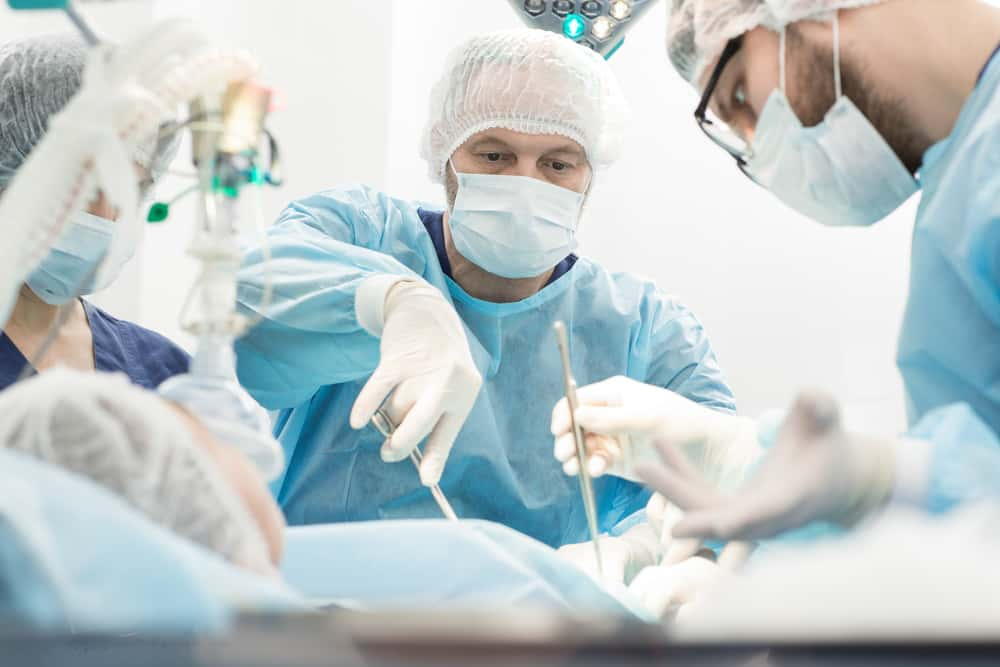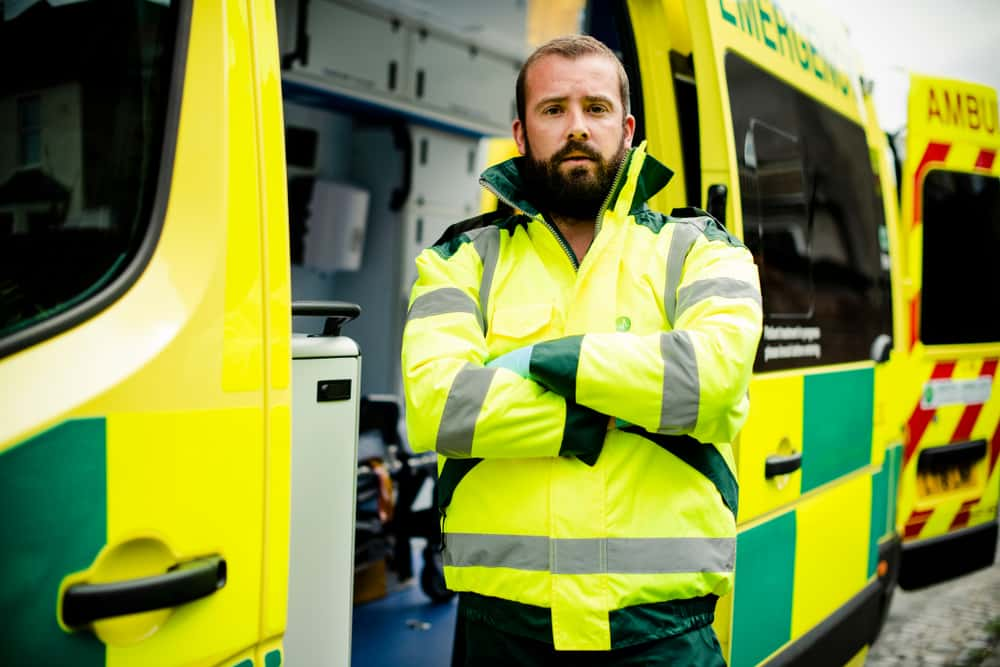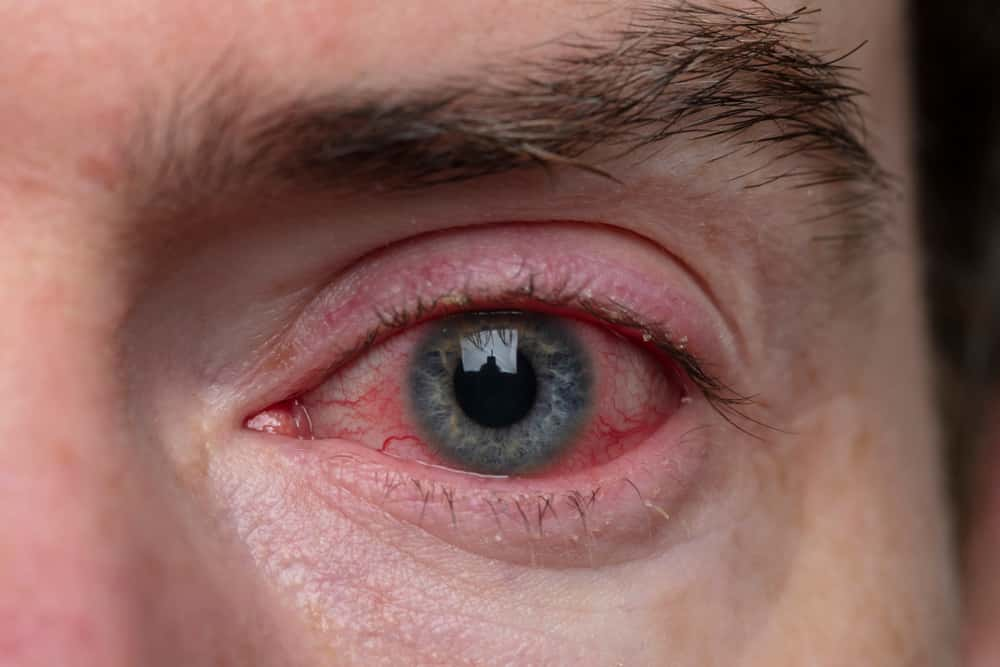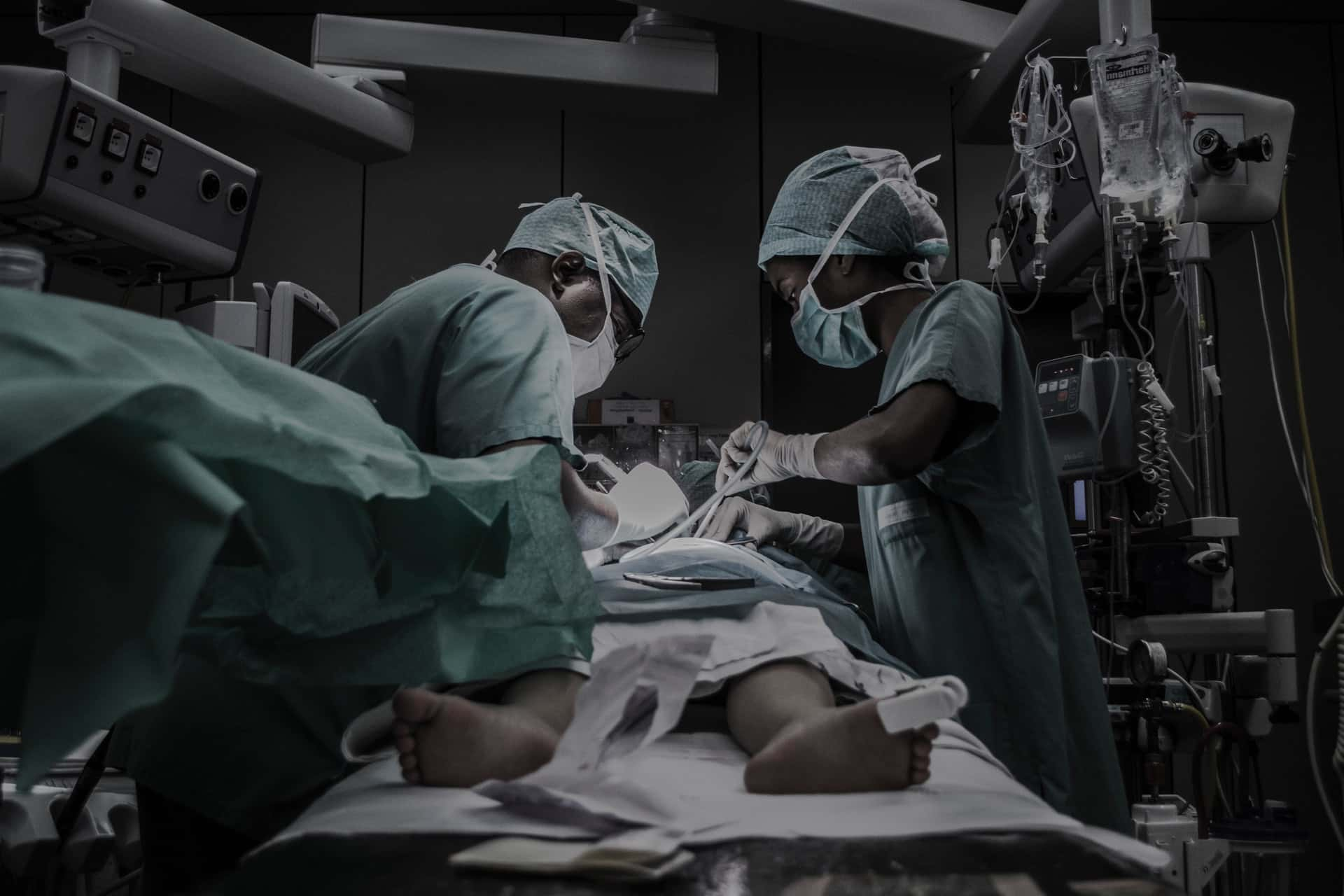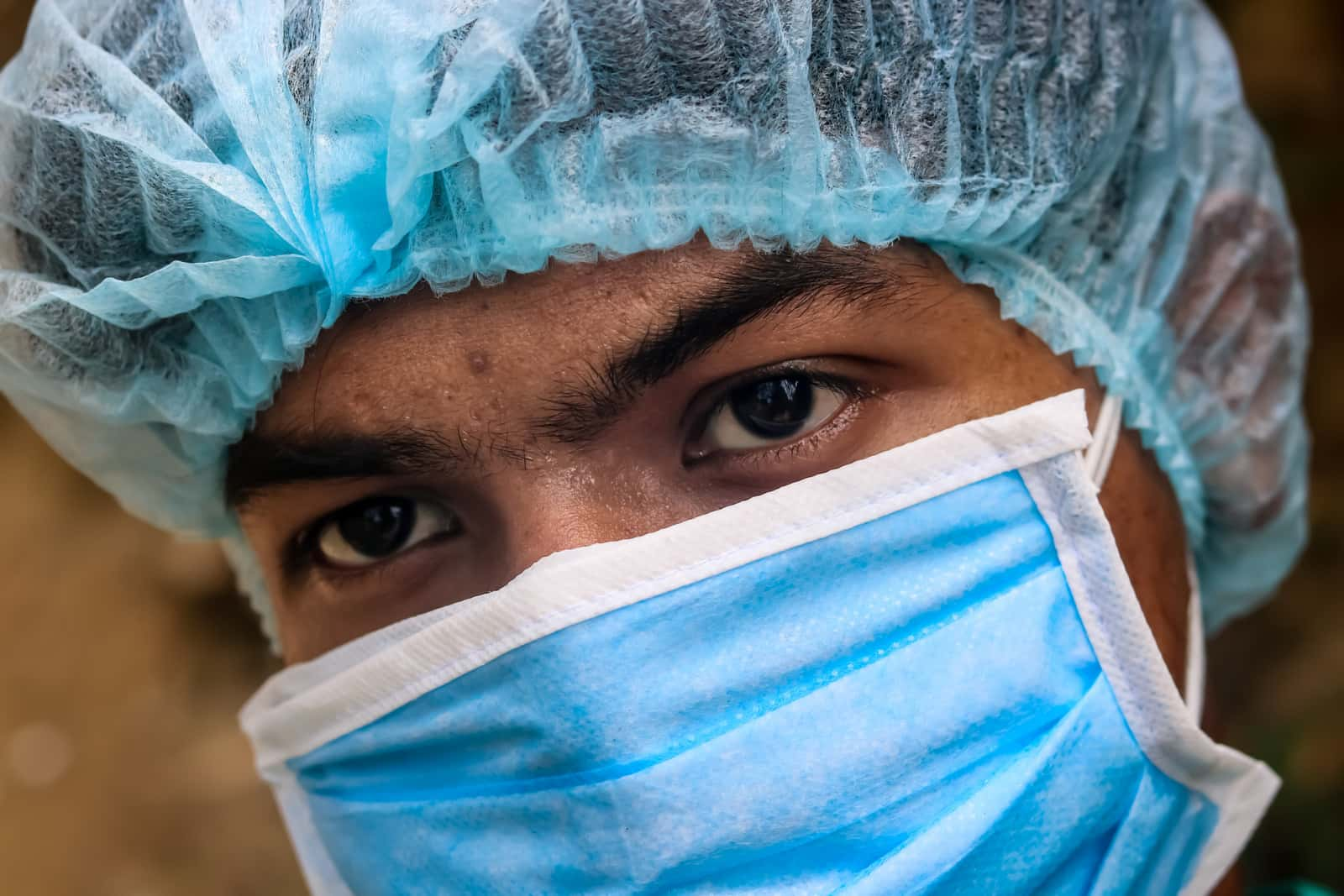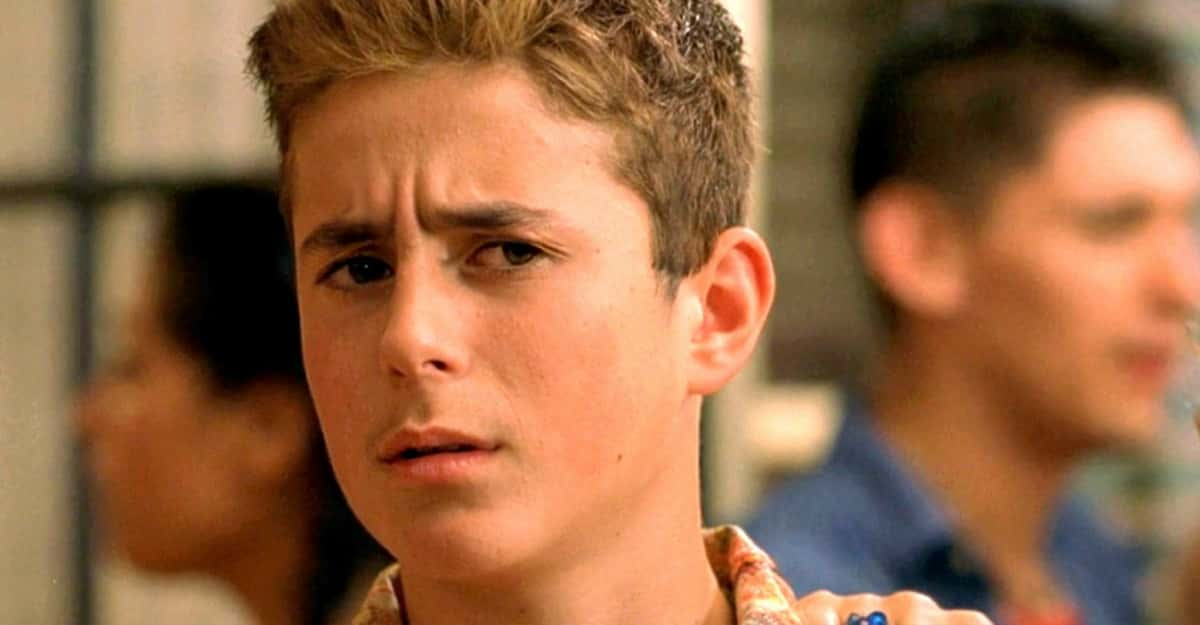Becoming a doctor takes years and years of hard work, but these physicians were faced with cases that were so horrific, they made them question whether or not they should just walk away and never look back.
1. Thar She Blows
I was NOT prepared for the day a patient exploded in surgery and splattered all over the entire operating team. Basically, a watermelon-sized tumor was being removed from the patient. It turned out, the tumor was more of a giant cyst. The surgeon didn’t open up the belly wide enough to facilitate the thing, so imagine someone trying to dig out a giant water balloon from an eight-inch incision with their hands.
The pressure on the tumor caused it to erupt out and upwards, spraying its contents on everyone and everything in the room. On the positive side, this made the removal of the thing A LOT easier. I do recall a lot of people screaming when it happened though. The patient came out fine!
2. And the “Eyes” Have It
I was a junior doctor working in the neurosurgery department back in 2008. One of the senior registrars I worked with told me his most unfortunate moment in the operating room. In order to have a patient’s head stabilized for surgery, he used a frame that had a set of three spikes that held the head in place. Due to the angle he needed to approach from, this required the patient to be face down.
As he was placing the head of the anesthetized patient onto the frame, the unimaginable happened—the head slipped and his eye landed on to the spike, perforating the eyeball. Panicking and thinking that his career was now over, he then started poking at the eyeball, trying to work out what was what until the anesthetist told him to stop.
They then called the ophthalmologist who came to tidy up what was now a completely ruined eye. After the surgery, he went to explain to the patient what had happened. Understandably fearing the worst—anger, distress, and tears—he received the response of, "That's OK, I was blind in that eye anyway!" from the patient.
Luckiest guy ever.
3. An Upset Stomach
I was in charge of the ICU unit the other day and we had a pretty messy situation. We had a patient who had some big abdominal trauma. He had gone to the OR and he was too sick for us to be able to close his abdomen, so we left it open. We had a sheet of plastic protecting his intestines and we placed a vacuumed sponge dressing on top of it called a “woundvac.”
The patient's nurse called me into the room to look at the abdomen because she thought she saw pieces of the bowel seeping out of the bag and getting sucked into the “woundvac.” I agreed and thought the bowel looked pretty dusky as well, so we called the doctor to come and look at it. He advised that we take the woundvac off, tuck the bowel back into the bag it had escaped from and put a new woundvac on.
It all just sounded like it was going to be a disaster, but whatever. So, we took off the “woundvac”—we could see that the patient’s bowels had become very swollen from the fluids, trauma, etc. Just as we were lifting it, the unexpected happened—the patient’s bowels all slipped out. The bag had dislodged significantly. When we tried tucking the bowels in one side, they would spill out the other.
The guy was in his bed just disemboweling and we simply could not get everything back in. Luckily, the anesthesia we had given the patient kept him very nicely sedated...But it was MESSY. We really had to step back and say, "Well, shoot. How do we get this guy’s guts back inside of him?” We ended up having to call in six other people to help tuck things back in. We finally got him back to the OR for them to get everything back into its proper place.
4. Right Down To The Bone
I’m not quite a surgeon but I received some medical training. I was bisecting someone's leg and I hadn’t realized that the person had a metal rod through their femur. I’m not a construction worker, so I don’t know why I did what I did...but surgeons must press on. So, I did something that no one in the OR could have predicted. They all just stared at me with their jaws to the floor. I proceeded to cut through the bone with a metal saw. Sparks were flying everywhere and before long, my blade broke.
Luckily, I was standing off to the side instead of directly behind the blade as it flew backward and hit the wall. The clothes the person had been wearing were lying underneath the body and caught a spark. My “Oh, God, what have I done?” moment only lasted a second. I was able to douse the person with the water hose before a large fire could start.
Fortunately, the person I was operating on was deceased…or I would have been in big trouble.
5. The Zen Master
I’m a thoracic surgeon. I was still a young intern when this happened. I was young enough that the senior surgeon wouldn't let me perform the whole surgery (under his supervision, of course), but old enough that he allowed me to do parts of the procedure. He might have overestimated my abilities at the time, honestly.
In my mind, I was doing a pretty decent job of dissecting a branch of the right pulmonary artery, freeing it from the cancerous nodes around it. Then, suddenly, dark blood started pulsing out of it. It was like the tide coming in, only way quicker—and way redder. My brain froze and I could only think, "Oh shoot,” but in far less family-friendly language. I then realized the grave error I had just made.
I had perforated the pulmonary artery—a very fragile organ that carries two and a half liters of blood every minute. Thank goodness my senior surgeon was the Zen Master he always is. He put his finger on the breach which stopped the bleeding immediately, then looked at me and just winked as if to say, “Well, you're in trouble now, aren't you?”
He stitched the pulmonary artery up himself and finished the procedure as if nothing had happened.
6. Close To The Chest
I had just gotten my first job out of college at the local hospital. My first week went by with the usual stitches and broken bones. My second week around midnight, this very obese woman came in complaining of chest pains. So, we rushed her back, grabbed her vitals, and did an EKG and blood work. Everything was normal—or so it seemed.
The problem was, she was still complaining of chest pain. So, my supervisor and I asked the lady if we could do a head to toe check-up. Now this woman had a rather pungent smell to her when she came in, but I have learned to not think of it as the people in the area weren't known for their cleanliness. We were looking at her chest.
I noticed that her left breast was reddened and swollen. I told her that I was going to lift up her breast to rule out any skin infections. As I lifted up her breast, a wave of noxious stench engulfed the air around me. As I kept lifting her breast, I could see what looked a mass of rotting tissue going into her chest.
My supervisor ran out of the exam room and proceeded to vomit in the nearest trash can. I looked at the lady and asked her why she didn't come in earlier as it looked like a massive skin infection was raging under her left breast. She replied that she did not have insurance and that she didn't think it was a huge deal.
I called in some nurses and the doctor to assist cleaning the wound. As we’re cleaning, one nurse noticed a bit of fur and bone. That's when we made the most horrifying discovery of my career. We found out it’s a small animal of sorts. They collected the sample and sent it to pathology. We removed it and noticed that it had rotted into her chest so much that her ribs could be seen.
In the end, it was the lady’s missing kitten. She spent four months in the hospital for massive sepsis and other related issues.
7. Bad Point
I had a guy come into my clinic one day with a complaint of finger swelling. His finger got swollen and painful about a week prior. It just got worse and worse, and about three days before coming, a hole opened up in the tip of his finger. The day of the visit, he said, “By the way, I pulled something out of the hole." The second he said it, my stomach dropped.
“I did it yesterday with a pair of tweezers, no idea what it is.” I asked him if he took a picture or had it, and he produced a tissue from his shirt pocket. It was his distal phalanx, the last bone in the finger. The bone had gotten infected, did its thing, and his body basically tried to eject what was now a hot foreign body.
The guy pulled his fingertip out of his fingertip. A better magic trick, I have not since seen.
8. A Real Head-Scratcher
This one was fun: a patient in the ER received a standard urine substance screen. The test came back positive for ethanol, but the patient insisted he never drank a drop. The test was then repeated. Positive. The patient got very upset. He swore he did not drink. So we drew a blood test. That's when things got weird.
The results came back negative. We checked everything we could think of. Did we have the right urine? The right blood? It should be impossible to test positive on urine and negative on blood. Meanwhile, I finished his regular urinalysis. He had a high white blood cell count and really high glucose. Elevated white cells usually require microscope inspection because it could indicate an infection.
I looked and it was loaded with yeast. That’s when it all made sense to me. The man was obviously diabetic and had high sugar in his urine, along with a yeast infection in the bladder. See, the yeast was fermenting the sugar into ethanol in his bladder. He then became known as 'The Man Who Peed Beer.'
9. It’s Getting A Little Hard To Breathe
I’m a nurse. In this medical nightmare, the doctor was an anesthetist. The patient had her surgery (I can't remember for what) and it all went well. She was awake and in recovery, but we still needed to give her medication through her IV line. As is standard practice, we flushed the line with ten milliliters of saline. Just as soon as we did that, the patient had a reaction that made our hearts stop beating. Almost immediately, she stopped breathing and we had no idea why.
We called the code and the anesthetist came running. He actually said, “Oh God!” when he realized what had happened. During the surgery, the anesthetist had given the patient rocuronium through that same IV line and he hadn't cleared the line afterward. So, when we flushed the line, the patient got a dose of rocuronium that had been sitting in the line.
In case you’re wondering, rocuronium is a muscle relaxant. It’s used to inhibit the respiratory muscles to allow for intubation and ventilation while under general anesthetic. In layman’s terms, it paralyzes the breathing muscles so you can't take a breath no matter how hard you try. But that's not even the scariest part. You'd think it puts you to sleep, but it does quite the opposite.
This patient was wide awake but totally unable to breathe throughout the whole ordeal. Luckily, the anesthetist worked out quickly what had happened and easily reversed it. The patient was physically fine but understandably traumatized.
10. When Nature Calls
This happened to me when I was in training to be a cardiologist. This disaster occurred during just my second or third heart procedure. Everything was going well until, all of a sudden, my senior doctor ran out of the room. He just ripped off his surgical gown and yelled "Oh, no!" and left. This surgeon had just abandoned me, a student, to complete his surgery. Little did I know I was in for the worst panic of my life.
I had just positioned these catheters with wires into the sleeping patient's heart. They were just hanging out, pulsating to his heartbeat. I had never made it to this point in the procedure before and I started wondering where to take it from there. I hadn’t even learned how to take the catheters out safely. I was looking at the vitals and monitors like, “Oh no, what do I do now?”
They paged my senior cardiology fellow in training but he was taking a nap and not returning any of my pages or calls. There were no other doctors around. Finally, thank God, my tech assistant who had done these procedures before gave me a nudge to flush the catheters out in order to prevent blood clots. After a few minutes, I had properly removed the catheters and wires.
Apparently, the doctor had gotten food poisoning and had to make a run for the bathroom.
11. Show Me Your Teeth
If you have a patient in labor (or in any painful procedure) who wants to hold your hand, only let them hold two fingers. They can't squeeze them too hard and break the bones, yet they still get the comfort of human touch. I've had patients in labor pinch me, pull on my clothes, and squeeze my two fingers as hard as possible. Some are just panicked, but some seem to be angry and want to hurt someone.
I always calmly ask them to stop with the pinching or pulling on my clothes because that really isn't helping them. These are often people who have refused an epidural because they are afraid of needles. While I understand that, I myself refuse to go black and blue. I always teach the new nurses or students the two-finger trick.
Which reminds me: Several years back, I had a couple in for a delivery. I asked what method of pain control they preferred. Their response was bizarre. They looked at each other, giggled, and then he said, "She bites me." I asked for clarification, and apparently, during her first two deliveries when the contraction pain became unbearable, she would take his hand and literally bite the heck out of his knuckle.
They were both hip to this plan and oddly proud of it. Fast forward to a couple of hours—the labor was getting well advanced. I looked up while doing an exam and saw her clamp her teeth on his calloused knuckle. She appeared to be biting with full pressure. He made a bit of a face but not a sound. Soon after, we ushered their youngest into the world.
When the contraction would start, she'd take a lung full of air and push to the count of 10 while biting the heck out of her man. It worked for them, so who am I to judge, but it made me somewhat uncomfortable.
12. Arm, Meet Hammer
I broke my wrist once. I had to undergo surgery to have the broken bone adjusted so it would grow to be a nice and functioning bone again. It appeared to be an easy and uncomplicated procedure, but then two hours later, I woke up with a cast around my arm, which they never told me I would need after the surgery. The doctor assured me everything went fine, but a couple of weeks later, I returned to him to have the cast removed...
As soon as he took it off, my blood ran cold. The surgeon had a confused look on his face and I could see him with that “Oh God” look. He told me perhaps the surgery didn't go exactly as planned. He hadn’t placed the two parts of the bone in a straight-line during surgery, so after a couple of weeks in a cast, my arm had healed in a funny and crooked way.
In the end, he had to rebreak my arm and put it in a bit more of a straight position. A few weeks and a wicked-looking scar later, everything was okay again!
13. A Generous Blood Donation
I was working in the ER one night when this huge dude, maybe 300 to 350 pounds, came in from a car accident with the paramedics giving him CPR. We quickly decided that he would have to go to the OR as he eventually flatlined. I was new and my knowledge was pretty limited at the time, but I knew they were going to have to massage the guy's heart.
I was pretty relieved since we had all been taking turns pumping this big man's blood for him. Shortly after he left, I was talking to some of the medics and doctors and they said that it would be a great experience for me to watch the procedure in the OR. So, I scrubbed up really quick and went in to watch in the back.
When I got to the OR, they were just about to start cutting the guy open. I watched in excitement as they began cutting through everything. Then, suddenly, everything that could have gone wrong went wrong. Blood started bursting out of this guy like a pot boiling over. There was more blood than I had ever seen (and hopefully will ever see again). I don't remember anyone saying, "Oh my God," but I remember everyone getting really quiet.
The operating team stepped back as the blood flowed out of him, onto the table, and then falling on the floor. The pool of blood crept across the floor until it got a couple of feet away from me. Most of the operating team were standing in a lake of blood by the time it stopped. The surgeons said that it looked like at least three liters of blood.
It was like something out of a horror scene and I think I was in shock because I felt so weird and out of place afterward. Later on, I found out that upon a closer inspection of the X-rays, the poor (and very large) man's sternum had given way. The going theories were either that his sternum had broken when his chest hit the steering wheel during his accident or from the CPR performed by the paramedics. People don’t realize how dangerous CPR can be.
The bone had splintered and punctured into his major blood vessels so we had just been pumping blood into his pericardium (heart sac). That’s what exploded when the OR team cut him open. There was little we could do to save this man's life. After that episode, the sight of blood never bothered me anymore.
14. Can We Rain Check This One, Please?
My husband broke his back at work. Because we had to go through the insurance company, they made him go through everything but surgery first. Six grueling months later, and they finally approved him for surgery. He was in severe pain for months leading up to this, so we were really looking forward to this procedure.
On the day of the surgery, they wheeled him in and I sat in the waiting area with about a bunch of strangers also waiting for their loved ones. I knew it would be about five hours, so I was just settling in when I got the fright of my life. Approximately forty minutes into the surgery, a nurse and the surgeon poked their heads into the waiting room.
The surgeon looked directly at me and says, "Um, we have a problem. Can you step out here please?" My knees buckled. I felt the air leave the room as all the others gasped. I somehow found my feet and floated out to the hallway. The surgeon said, "Your hubby is fine, but right before I made my incision, I double-checked the cage (the equipment they put in to stabilize the spine) and it's the wrong size. We have to wake him up and reschedule.” Biggest sigh of relief ever.
The surgery ended up happening two days later but my poor guy suffered a lot. Looking back, I'm really glad that the surgeon double-checked before cutting into him. The hospital was extremely accommodating to us afterward—to a fault. They were very nervous about a lawsuit. We just forgave them and moved on. Mistakes happen.
15. A New Perspective
This is my mom’s story. She used to work at a non-profit clinic that would give free healthcare to people who didn’t have insurance. This guy came in one day with his teenage daughter saying that he was between jobs and the insurance for his new job hadn’t kicked in yet, but his daughter was having her yearly case of pneumonia and just wanted her antibiotics.
He was really arrogant and rude, saying stuff like, “She has a CUBAN doctor she usually goes to.” My mom is Mexican and I live in an area where most Latinos you see are Mexican. My mom, staying calm despite wanting to bite the guy’s head off, examined his daughter. She noticed his daughter’s fingers were clubbed. This was an unsettling sign.
See, it was indicative of a serious, chronic respiratory issue, and not something temporary like pneumonia. She asked if she could run a few tests just to be safe, and at first, he was huffy about it, but he eventually agreed when my mom told him it wouldn’t cost him anything but a bit of time. A few days later, the clinic called her out because this girl didn’t have pneumonia.
She had cystic fibrosis. The girl was transferred to a hospital where she could actually start receiving treatment for her condition. Thankfully, it was a minor case—if it was anything more serious, she honestly could have been gone by that point, My mom probably prolonged this girl’s life expectancy by a huge amount with the diagnosis.
Her regular “Cuban” doctor had been regularly misdiagnosing her with vitamin deficiencies and pneumonia. Later, the father called my mother and thanked her for helping his daughter. My mom was going off in her head (“What about her Cuban doctor huh, buddy?”) but was polite and wished him and his daughter well.
16. Out Of Sight, Out Of Mind
I just left a medical practice partly because a woman brought her eight-month-old in for a second opinion. The owner of the practice had seen the rapidly enlarging sacral soft tissue mass that the mother first noticed about six weeks prior. He told her not to worry about it. I checked his notes and I was shocked. They just read, “Plan: ignore.”
There was a new rapidly enlarging cystic mass on a baby’s sacrum. Basically, it looked like a small plum under the skin at the top of her bum crack. Without any investigation, my colleague dismissed it. I was appalled, but the mother was obviously relieved. Of the many not-so-great judgments I’d seen from him, this was one of the worst.
I realized I couldn’t work in a clinic where I’d be stepping on other doctors’ toes whenever I questioned their judgment. The baby had scans done and was eventually referred to a pediatric surgeon, but unfortunately, I don’t know the outcome because I’m working elsewhere now.
17. Stuck Up
I’m an OR RN and got called in for an exploratory laparotomy. Some late staff had gotten the case ready and patient in the room when I arrived. I walked into the room to see the patient’s testicle was bigger than a basketball with two people holding it up to prep it. The guy had a big part of his bowel in his testicle.
His bowel had ruptured due to the pressure. We suctioned poop out of his abdomen for over an hour. He lifted something heavy the week before and felt a pop. He hadn’t urinated in two days because it was so swollen that his thing was not visible. That’s why he finally came in, he couldn’t pee. But it’d grown for a week.
Unfortunately, he didn’t make it. He lived through three abdominal surgeries, but sepsis did him in from the ruptured bowel.
18. Poker Face
Sonographers have to keep a poker face a lot of times when they see something very alarming or sad on the screen. Luckily, most people have no idea what they are looking at, but they’re not allowed to give any results to patients since doctors deliver the bad news. They simply have to stay neutral. A couple of months ago, I had an ultrasound done and was talking with the sonographer about how happy I was to be having a baby.
I’ve lost many people this year and I needed some good to happen. Then I saw her face, and my blood ran cold. It wasn’t super obvious, but I knew. My baby’s heart wasn’t beating, and I didn’t see any movement. She pulled away and told me that a doctor would call me that day. It was awful for me. I remember calling my doctor a few times that day because I wanted to know those results right away.
When I finally got it, I broke down. But I still feel really awful for her. She didn’t say much, but I could really see her heartbreak too. Their job is a lot harder than most people would imagine.
19. An Unholy Terror
I had a 60-year-old female patient show up for a same-day appointment to establish care from out of state. She had no medical records and she denied having any history of taking medications. She never smoked, drank, or anything. Midway through the exam, she started telling me that she was seeing "evil lines" all over her house at all hours of the day.
She said that she was unable to cross the lines and was therefore unable to access certain parts of her house like her bathroom. She claimed to hear voices coming through the walls and feel shadows at night. She also thought her neighbors were hexing her all the time. At some point, she started talking about the occult and freemasons ruling the world.
Then, suddenly, she stopped mid-sentence, stared at me without blinking, and asked if I could perform an exorcism. Err... Sorry. I missed that section in medical school.
20. There’s A Butt
The complaint in the man’s file was rectal pain. I immediately thought hemorrhoid, abscess, or a fissure. When I saw Mr. Rectal Pain, he told me he had pain down there but had no other symptoms. I got to the examining part it was normal looking. At that point, I had to proceed with a rectal exam. The result made my jaw drop.
I digitally examined him and he instantly said, “Ow, there’s something sharp in there.” Out came a fishbone. It was big too, like two or three centimeters long. I asked the patient about it and he was like, “Oh, I had red snapper a few nights ago.” I put the fishbone into a specimen cup and started parading through the emergency department showing everyone what I just “fished" out of some guy's butt. Oh, and there’s a coda to this tale.
I told this story to my colleague and he proceeded to tell me how in his residency they did rectal exams on all trauma patients. One time, one of his fellow residents went to perform one and the patient said the exact same phrase: “Ow, there’s something sharp in there.” But instead of a fishbone, it was a hypodermic needle. You can’t make this stuff up.
21. It Was…Shocking
This story comes from my vet. He was in a super run-down barn with a pregnant mare in trouble. She'd been getting up, lying down, and getting up again, but nothing was happening. Apparently, horse births are difficult because the foal doesn't turn until minutes before the actual birth is supposed to happen. If they're in the wrong position, things could get deadly for the horse as there's nothing in there but rigid legs and sharp little hooves.
So, there he was at night, up to his elbow in this frightened mare. She wasn’t really into what was going on and didn’t want to stand for it. The vet wasn’t terribly fleet of foot in that position, so it was up to the owner to keep the horse calm. Now, keep in mind this barn was in horrible shape. Really, it was just a dilapidated health hazard.
Well, the mare decided she'd had enough and tried to walk through the owner. That's when everything took a turn for the worst. I'm guessing there was a stud chain involved (a metal chain that loops around the nose, jaw, over the gums, or however you want to attach it so that you have more "persuasive" power over the horse). The horse shoved the owner off-balance and, before they fell back, they managed to grab a live, uncovered wire.
Why there was a live wire in this old barn, I will never understand. But the result was that current flowed through the owner to the horse and into my vet. So now, the poor vet was elbow-deep in a terrified mare while all of them were getting electrocuted. He didn't explain to me how he got out of that, but the mare was okay and she delivered a live foal.
They named the filly Electra.
22. Super Soaker
Right as I was about to graduate from medical school, I had one of the most formative experiences that led to my surgical career. I was on-call late one night with a chief resident who was really a pleasure to work with. He let me take the lead on minor procedures and helped me work on the things that were actually interesting among the drudge work.
Well, this was not one of those enlightened moments, but it fits the question. This wonder chief—we’ll call him Wiggles—called me to the ED to assess a patient for possible surgery. “Amazing!” I thought, “He trusts me enough to let me work up this patient!” So, off I trotted in a fervor of anticipation to the room where my patient was.
Wiggles was standing there with this pie-eating grin on his face. He just said, “The orders are in, but you need to do the pre-op note and you'll be doing the procedure. Enjoy!” Then he just walked off laughing. “Interesting,” I thought to myself. But I wasn’t about to let Wiggles rain on my parade. I decided that I was going to have this moment to shine and all would be well.
But when I walked in, I quickly realized why Wiggles was laughing. What I saw haunts me to this day—It was a bum-puss case. For those of you who haven't had the pleasure, a bum-puss case is when you have an abscess filled with the vilest, malodorous, repugnant filth to ever grace the medical profession. You have to open up the glory of this pocket of putrescence so that the cavity in which it dwells can fill in with nice, healthy, non-bum-puss. They most often occur in people who already have trouble fighting infections or have a lot of tissue where they can hide a pocket-o-poo.
My guy was a stinky, sugary, smoke-stack of a whale. He also had what was a massive amount of puss hanging out just under the skin of his VW-Beetle-sized butt. Thankfully, it was an easy workup and he was actually a nice guy with a great sense of humor. Wiggles had told him that a stupid med student would be doing the honor of treating him. As I was getting him ready for the procedure, he said, "I just want to warn you. I'm a squirter.” That stopped me in my tracks.
“Haha, don't worry buddy. You'll figure it out," he said. Writing this story now, it's obvious what he meant, but I was naive and still psyched about doing my own procedure that I just forgot about it and went to the OR to get everything ready. As we got the guy positioned on the table, it occurred to me how truly large this guy was.
He had to be around 450 pounds and he had rolls of fat dripping down his legs. We had to put his legs in stirrups so that we could get to his bum crack and do the procedure. I positioned myself front and center, staring deeply into this guy’s brown eye while the chief resident and attending physician held—with both hands—rolls of fat aside so that I could get to the area in need of debridement.
I numbed his skin, called for the knife, and then stopped. In that second, I realized what he had meant about being a squirter. There was no other reasonable explanation and I can't imagine why I hadn’t realized it sooner. But being the only one scrubbed and prepped for the procedure, I had no choice but to proceed. The attending, perhaps sensing my hesitation, looked down at me with a smile that was visible through his surgical mask. “Son,” he said, “We've all been there. Well probably not there, but it doesn't matter. You're going to do this."
I leaned forward and placed the blade into the puss pocket. The big beluga of a patient gave a great heaving snore and then a cough. He shifted what must have been half an inch down right as I pierced the skin. The increased intra-abdominal pressure combined with this guy’s massive thighs acted like a finger over the end of a hose. Then, the worst thing to ever happen in my career happened. A straight shower of feculent horror blasted forth, covering my surgical gown, cap, shoes, and glasses.
I was speechless. My brain couldn’t simultaneously process the horror, hilarity, and smell of what just happened. The other attendants in the room, however, had no trouble as they'd been expecting that from the start. I handed back the scalpel to the scrub nurse, the only one to keep her composure, while the attending, chief resident, circulating nurse, nurse assistant, and the three other med students who had been watching from the door all completely lost it. I must have looked like a medical Jackson Pollock.
I truly wish that I had had a witty response prepared. Or that I’d been cool enough to just keep going as if nothing had happened. I couldn't see through my puss-caked goggles and I must have smelled worse than a pigsty. I let out a meager, “Uh, can I go change?” The attending, laughing way too hard to make any sense, simply nodded and pointed out of the OR.
I took off the gown and all the puss-covered materials and went to take the longest, hottest shower possible. I put the scrubs in the laundry and promptly told the maintenance crew that they should burn those clothes…immediately. The guys laughed until they saw the damage, then the laughter turned to faces of horror. It was their problem now.
As I understand it, the rest of the procedure was uneventful. When I went back into the call room, the rest of the med students gave me a standing ovation. By that time, the hilarity of what had happened had surpassed any embarrassment that I had felt. The patient had had the procedure before and had, apparently, oozed quite a bit.
It was my worst moment in surgery. Though it was gross, I wasn't really that disturbed on a deep level. After that, I feel like there is very little that would shake me at the core in terms of bodily fluids. After all, I was baptized in the absolute worst of it.
23. Close Call
I'm a midwife and I was the one who gave a second opinion. The first diagnosis was given by the woman's family doctor. She came into the antenatal clinic and said that she had a headache she couldn't seem to shake. She'd called her general practitioner the day before and she had told her to take two Aspirin and have a bath to remedy the situation. What she didn’t know almost ruined her.
Whenever any pregnant woman complains of a headache, especially one that won't go away, it sends alarm bells ringing as it can be a symptom of pre-eclampsia. Sure enough, the woman also reported seeing blue spots, exhibited a blood pressure of 220/180, and had a huge amount of protein in her urine. I got her to lie on her side in the room I was seeing her in and I raced to get a more senior midwife.
It wouldn't have been more than 60 seconds until the two of us returned to the room—just in time to see her start having an eclamptic seizure. We called a Code Pink (obstetric emergency), which then escalated to a Code Green (alerting the operating room that we were coming down immediately for an emergency cesarean). The woman gave birth under general anesthetic 20 minutes later.
I still start sweating when I imagine what could have happened if she hadn't come into the clinic that day.
24. Code Yellow
I worked as a doctor's office assistant. A regular patient, who was very sweet but unfortunately had an ongoing battle with drinking, was brought in by his roommate, and I knew instantly that he would be gone soon. I'd seen some jaundiced humans in my time there, but the man was a yellow I never knew could be possible.
His roommate said, through tears, "I've been telling him to come in for weeks!" The patient kept telling the roommate to relax and that he was fine. I helped him into the exam room, and when the doctor entered the room, he immediately asked me to go call an ambulance. A few weeks earlier wouldn't have helped him that much.
He was gone seven days later in the hospital. It had hit me very hard because I'd known the guy for a few years. Sometimes he would be sober when he called, and sometimes he would be slurring and completely incoherent, but he was ALWAYS kind.
25. The Saga Of Private Idiot
I was a combat medic in the Army. After basic schooling, I showed up to my first duty assignment. Now, as a fresh little private, I expected my job to be more oriented towards combat medicine, hence the job title. That's when I got my first taste of "Don't get your hopes up." There I was, expecting to settle in when they told me I'd be pulling medical coverage for a 15-mile ruck march.
At that point, I had a couple of thoughts: 1. Do people really walk 15 miles? 2. What the heck is medical coverage? 3. I don't even have an aid bag, how do I treat people? I got the typical response of "figure it out." I basically started looking for the friendliest faces in my medic platoon, but mind you—most of this platoon got back from Afghanistan a few months prior and they were already exposed to live combat casualties.
That meant there were no friendly faces. When you are the new private, you are underneath the bottom of the barrel, so NO ONE likes you. Long story short, after a few push-ups and stuff, I got the aid bag. I went over my notes, trying to prepare myself for gore and broken limbs. But no, this is where I truly got in over my head. It turns out, the main casualty any medic will see is a heat casualty. Apparently, the one thing these men just didn't do...was drink water. Not one person drank water and because of this, guys would drop like flies.
So let's fast forward a bit. The ruck was happening, and a few miles in, I finally got my first casualty. I hopped out like Captain America with my little cool guy shades on and my helmet unbuckled, thinking I looked cooler than I actually was. In school, they covered heat casualties in about five minutes and I was asleep in class for most of the time.
So there I was, freaking out on the inside. I still tried to treat my casualty as best I can. I brought out the ice sheets, placed him in the shade, the whole shebang. I eventually got him in the truck, removed his clothes, and performed an exam. Naturally, at that point, I was feeling good about myself. "He's still alive so we good." And then I got to the one question that messed me up more than anything.
“Did you get a core temperature?" No, no I did not. This process is simple, but in training, you don't really get the full experience. See, this task requires you to spread their cheeks, maintain steady eye contact with the eye of Sauron, and insert a thermometer while holding back your own vomit. We called it biting the silver bullet.
Everyone knew about the notoriety of the silver bullet, but I was the one who had to bite it. As I was gliding it down the booty crack, I felt it give in. In my limited experience, I thought this was the bootyhole. Wrong. It was not. It was rather, what I call, a phantom hole. Everyone looked at me like I was the dumbest man to ever exist. "THERE’S ONLY ONE...HOW DO YOU MISS?"
As this exchange was occurring, the casualty was just writhing back and forth in pain because I kind of forced it in there pretty hard. I was trying to convince him that I had to go for round two, and after a fruitful conversation, I tried again. I finally got it in the right place. I just left it there for a bit while I started to do paperwork. After about five minutes, my NCO was yelling at me again.
"WHY THE HECK IS THE THERMOMETER STILL IN THERE?", I sputtered out, "SARGE, I THOUGHT WE HAD TO CONSTANTLY REASSESS!" Yeah, Private Idiot, you don’t have to leave it in there. Needless to say, I had to write an apology letter for tormenting this innocent victim. For God’s sake...they never taught THAT in school.
26. That’s Nuts
I was a student assisting in the operating room when we came across a shocking discovery. A 65-year-old guy with kidney problems (possibly cancerous) needed to have a chunk of his kidney removed. It sounded like no big deal. We gave him his meds, knocked him out, then prepared to operate. But when we removed his gown, everyone in the room froze.
One of the surgeons actually exclaimed, “Balls!" That was relatively accurate. Apparently, our guy had some muscular disease that caused a massive abdominal hernia, and his intestines were herniating into his scrotum. It was honestly about the size of a deflated basketball.
27. Quite The Buzz
I work in a very rural hospital. An elderly farmer came in with chest pain that “wouldn't go away,” as he put it. When we asked him if he had it before, he said that he had had this chest pain on and off for years, but it’d typically stop when he grabbed his electric fence. He told us about when he first had the pain.
He was standing out near an electric fence on his farm and reached out to steady himself. He accidentally grabbed the electric fence, which shocked him, and made the pain go away. So, when the pain would come, he just went to the fence, and it made him feel better. He had literally been cardioverting himself for years.
He was fixed up and sent on his way, but we all still chuckle about it now and then because he was so nonchalant about it.
28. A Twist Of Fate
Sometimes, even when you do everything you're told to do, tragedy happens. You are going to have an elderly patient who you know won't make it, but there is little you can do about it other than lessen the damage. There is going to be a patient’s family member you get a little too close to and you will feel hurt when they blame you for something.
You will trust your superiors and possibly get thrown under the bus for it. I had an instance where I had a new patient who arrived on my day off. The nurse gave me a very quick report about him when I came back and I was told that although he would be a little resistant, he wasn't combative. In fact, he was purposefully placed with me because I was pretty calm and often chatted with my patients.
We were short-staffed, as always. I had another nurse assisting me to transfer him, but the nurse had to leave to get an oxygen canister for him…and she never made it back. My patient got a little restless as we were waiting. I couldn't move him in his wheelchair as he was hooked up to a mounted canister, and I also couldn't leave him alone.
While I was standing there, he pulled a shocking move on me. I wound up getting punched in the eye without any warning. My glasses broke and I was stunned. I pulled the call light, but...nothing. I looked out the door but there was nobody there. I wound up using a phone to call the front desk and beg the nurse to come down because he hit me and I didn't want to be there alone.
It still took her 15 minutes. At that time, I started to realize something was seriously wrong. At some point, I went to the doctor myself. It turned out, I had a concussion, a minor cartilage break in my nose, plus a black eye and vision issues. It’s been a few months now and I've lost central vision in that eye and I have started getting spots and floaters in the opposite eye.
They're going to probably take my license soon. I’ve seen several doctors and specialists who are at a loss and don't think they can do anything. I've been told surgery wouldn't do anything because the rods and cones are pretty much gone in that eye. Plus, I have migraines daily now. I wanted to go to school to be a nurse. I'm not even 30 and now I have to give up on my dream.
Protect yourself. Little things can change your entire life.
29. You Should Be Feeling Very Sleepy
This happened during a procedure that I was working on. I was placing an IVC filter (a small metal filter that sits in the inferior vena cava to prevent blood clots from traveling from the legs to the lungs) when I got the fright of my life. It was meant to be a simple procedure. Basically, we were supposed to tunnel into the femoral vein and travel up into the vena cava where we would leave the filter in place.
In order to confirm our location in the body, we had to use a radiolucent contrast and an X-ray to light up the vena cava since we were basically looking from outside of the body. The scrub tech handed us 100cc of contrast and we injected it straight into the vena cava. Then we waited for the X-ray to light up... only, nothing happened.
Not able to figure out why we couldn't see it, we asked the scrub tech for another 100cc of contrast and again injected it into the vena cava. Again, no luck. At a loss, we thought maybe that the contrast was bad, so we drew up some more and looked at the syringe under the X-ray before injecting it this time. That's when we realized our huge mistake.
Of course, the syringe did not light up under the X-ray. While we were trying to get some new contrast into the OR, the patient—who we had sedated and intubated—began to seize. We finally looked over at the scrub tech’s table and realized what she had done. Turns out, she had been drawing up 100cc (twice mind you) of lidocaine, a quick-acting anesthetic that you are not supposed to inject directly into the central circulation of the body.
I was working with a very senior vascular surgeon at the time and I've never seen her look the slightest bit phased by anything. But when she realized what we had given the patient (and how much, i.e., 200cc of lidocaine) she looked like she was about to faint. Luckily, the patient suffered no permanent harm due to this medical error.
30. Too Little, Too Late
I asked my grandfather, a surgeon of 30 years, what his worst experience was. He told me a story about opening a patient up to fix something serious with his aorta (it's been ten years since I heard the story so the details are a bit hazy). Anyway, he and the other surgeon opened the guy up for this dicey operation. What they found shocked them.
When they opened the patient up, they found several significant tumors. Like, "Well darn, this guy is toast," tumors. He said he'd never seen so much cancer. They went out to break the bad news to the family, but little did they know that this guy made it to the pearly gates earlier than they had expected. And it wasn’t even cancer that did him in.
When they went back into the operating room trying to figure out what to do about the tumors, the patient’s aorta dissected. He began hemorrhaging with my grandfather and this other surgeon shouting and scrambling to clamp it up and stop the bleeding. But they were too late. The guy bled out. My grandfather said it was over in seconds.
He felt bad, but the guy was facing a pretty painful future anyway with all of those tumors. He figured that there was less suffering that way, but secretly I think he was upset that they couldn't save him.
31. Losing Face
We had a gentleman admitted because he had had an erection for several days and had lost the ability to pee. His bladder was close to bursting and his poor junk was...just think microwaved hotdog. Very bad. But none of that was as interesting as the fact that this dude had untreated skin cancer on his nose for several years.
Over some time, it had become infected, developed MRSA, and spread across his face. He had no nose, no cheek, and no eye on one side of his face and was starting to lose his other eye. You could see part of his skull. I don’t know why he chose to leave it untreated, and I have no idea how long it took to get like that.
I will never ever forget the smell and texture of his rotting face. We convinced him to have reconstructive surgery. He ended up getting a skin graft that covered up his eye, nose, and cheek. So, if you ever meet a very grumpy dude with nothing but a mouth and one eye know that this is way better than the alternative.
32. Keep Calm & Surgeon On
This one’s funny because the “Oh my God!” moment only led to more panic. My mom was an OBGYN and she told me about this incident that occurred early on in her career. She didn’t really make a medical mistake, but she still almost ruined the operation. She was performing a C-section when she dropped her scalpel on the floor.
Before she could even think, she blurted out, "Oh darn," as a reaction. The mother—who was in labor and already stressed out—freaked out, thinking something must have gone horribly wrong with the baby. She started panicking and it took the whole team of nurses, the husband, and the mother of the patient to calm her down.
In the operating room, it’s always best to stay calm.
33. The Woman Who Knew Too Much
My twin sister is a nurse. She most definitely didn't learn how to care for her own dying mother in nursing college. Our mother passed from cancer, and we nursed her until the very end at home. I was very thankful that my sister is a nurse and knew what to do, but the minute my mom passed, my sister could not be in the same room.
She had already seen so much tragedy as a nurse before, but nothing could prepare her for her own mother’s passing. I think my sister questioned her choice of being a nurse after that. To me, I was seeing my mom finally being released from all the pain she was feeling. For my sister, she knew what was happening below the surface.
She knew how my mom's lungs were giving in, and that her heart was failing. The thought that she knew that hurt me inside as much as my mom's passing did. I have a lot of love and respect for my sister.
34. Keep Your Mouth Shut
I was the patient in this “Oh my God,” moment. My crazy surgeon would never tell the story himself, so I’ll tell it for him. When I was 18, I had to get my impacted wisdom tooth removed. I went to a surgeon who informed me that the tooth in question was pretty much fully formed. For the surgery, he would have to put me under a general anesthetic so he could break up the tooth to remove it. It sounded pretty routine.
On the day of surgery, I went in thinking it would all be great. I arranged for my mother to pick me up after a couple of hours because I couldn’t drive home by myself with anesthesia in my system. She arrived and the staff informed her that I was still in surgery. After nearly another two hours of waiting, she felt like something wasn't right and immediately called my father.
My father came in and the staff told him the same thing; I was still in surgery. At some point, my parents finally said they wanted to see me and threatened to call the authorities. That's when the staff revealed the shocking truth—the surgeon had inadvertently broken my jaw. Apparently, instead of breaking up my wisdom teeth, the surgeon had tried to take them out in one piece.
On the very first tooth, he snapped my mandible. It popped up into the muscles in the back part of my cheek, coming up against two nerves, the trigeminal and facial nerves. In a total panic, this failure of a surgeon wired my jaw shut. He hadn’t asked my next of kin what they wanted him to do, nor did he take an X-ray. As it turns out, the reason you take an X-ray is that you need to make sure the bone is set. My bone was not set.
Over the course of the next two weeks, the bone didn't heal because it wasn't set correctly. It slowly sawed through my trigeminal nerve, destroying sensation in the lower right half of my face. I looked like a stroke victim because I had very little control over it. It's since gotten better and moves more or less with the rest of my face, but I don't have as much control there as I should.
This was probably the most pain I'd ever experienced in my entire life. I took liquid Vicodin (remember, the idiot surgeon had wired my jaw shut) every two hours. I could barely sleep and needed help with tasks like walking upstairs and going to the bathroom because of the pain and the medication. It was insufferable.
We eventually found a doctor to fix my jaw. He had to re-set the bone. This was about a six-hour surgery and it required a two-night hospital stay. The bone was so badly out of whack that it needed a plate and seven screws installed just to stabilize it. This new doctor had to keep my jaw wired shut for another ten weeks while it healed, but that's not even the worst part—later on, I was told the nerve damage was permanent.
The original doctor who broke my jaw refused to admit responsibility or pay any of the damages. Presumably, his counsel advised him never to admit to making a mistake. So, I sued for that. In the deposition, he said he broke up the tooth, which of course he hadn't. I had the tooth to prove he was lying, after which we settled for the amount of damage.
About 75% of the settlement ended up going to things like lawyers’ fees so I still came out behind on all that. But I have a wicked scar on my neck from the surgery and my other three wisdom teeth, so I have that going for me.
35. And This Is Why We Wash Our Hands
Sometimes, surgeons are the ones in for an unpleasant surprise. My father is a physician and, although he's not a surgeon, he did some surgery while in medical school. He told me a story about a patient he had once who had necrotizing fasciitis—a.k.a. a really nasty flesh-eating disease. I almost wish that he hadn’t told me this story. It’s like something out of The Walking Dead.
The patient had gotten a cut while gardening and never cleaned the wound properly. My dad told us that he had to peel back layers just to get at it. First, he peeled off the bandages that the patient had self-applied. Then there was a layer of holy book pages that he also had to peel off. Layer upon layer, bandage upon bandage.
Finally, beneath all that, was the wound itself. No amount of med school training could have prepared my father for what he saw. The wound was covered in maggots. Apparently, they were eating the dead-tissue generated by the disease. He said that once they removed the maggots, they were able to begin the surgery to remove the infected areas.
Oddly enough, this patient had the maggots to thank for keeping his appendages intact. Because the maggots had eaten away the dead and infected flesh, my dad and his team didn't have to amputate the patient’s limb. After this operation, though, my dad decided to not pursue surgery and focus on becoming a specialist.
36. A Thorn In The Side
This is my dad’s story. He was putting up a central line for a drip with an 18G needle (which is relatively big compared to most needles) in the patient's external jugular. All of a sudden, the needle went right into the jugular. My dad and his co-workers all started panicking because usually with a drip, the needle is meant to come out and only the plastic remains.
In his case, he had lost the needle inside this guy’s jugular. Before they could even fish out the needle it was gone. My dad looked at his fellow surgeons and nurses in total shock. They knew how could bad the situation was. Before they could do anything, they rushed the patient right into surgery. After a few minutes, they fished the needle out near his subclavian vein.
That vein is very close to the heart. It had traveled that fast. They all breathed a sigh of relief.
37. So Close
I'm a 22-year-old paramedic. Once, I responded to a cardiac arrest where an officer had called us after responding to a welfare check where she found a man unresponsive. We worked the guy, but it was quite futile. The officer had started CPR after calling, so we kept going for a half-hour with no response to treatment.
We called it after he remained in asystole without a hint of a response. The story was that the guy was out mowing his lawn when he began having chest pain. He stopped mowing, went inside, and called his wife who was at work. He told her he wasn't feeling well and wanted her to know. He sat down in a living room chair.
He took out a notebook and started journaling his symptoms. I'll never forget the two sentences he wrote: "My chest hurts. It's hard to breathe," and, "I think I'm having a heart attack." His wife tried calling him back after an hour or so and she couldn't get through. After another hour, she’d called for a welfare check.
They found him in the living room chair next to his journal, gone. Literally, this guy lived a block from our ambulance station. We hadn't had a call all morning until we responded to his house. He was a block away from me and my ambulance. I was mucking about the station. Had he just called me, I could have saved him.
Don't be this guy. Call emergency for chest pain, folks. I'll come. It's ok.
38. Makes Sense To Me
I’m a psychiatric-mental health nurse practitioner and went to a suburban ER to see a man who said he had a horrible stomach cancer and needed to lose weight to be better. He insisted that he'd been diagnosed by a very prominent gastroenterologist with "Barrett's stomach," which he couldn’t. It’s an esophageal problem.
His story was bizarre, and the staff did not know what to do with him. He eventually disclosed that he had shot himself in the leg a few days before and was waiting for gangrene to set in. He believed that the resulting amputation of the leg would allow him to lose the required amount of weight, thus "curing" his cancer.
I excused myself to let the ER staff know that they should probably examine the leg and to call the county psychiatric service, which was the protocol at this particular hospital. I'm not sure whatever happened to him but that was a very impressive manifestation of a delusion!
39. A Bonding Experience
When I worked in assisted living, I had a gentleman on hospice. He was a nice guy and was as cooperative as could be. 30 minutes before leaving one day, I was doing my rounds and making sure everyone was getting dressed. This patient needed assistance, so I started doing his routine. All of a sudden, he said he needed to poop.
I asked him if he could make it to the toilet. We tried to make it, but it was in vain. We ended up in the shower just spraying every time he passed a movement because it was the easiest solution. It was absolutely one of the worst things I’ve dealt with in my life. It seemed like it would never end. I ended up getting him cleaned up and in his freshly cleaned wheelchair.
Meanwhile, I stripped his bedding and the rest of the linen casualties that we’d amassed during this adventure. I tucked him into his fresh bed and told him I’d see him that night. My co-worker had the absolute balls to ask where the heck had I been while I carried all of his linen to the laundry. I told her to bug off because I had just handled the poo explosion of my nightmares completely solo.
Still, he and I became quite good friends after that. That kind of thing will bring two people together.
40. We Need Gauze Here!
I had a friend with a swollen area on his lower back. It got to the point where he could barely sit. He went to his doctor and he was told it was a pilonidal cyst. The doctor assured him that they would go ahead and take care of it. He told my friend to take off his shirt and lay flat on his stomach. As he laid there the doctor cautioned him that he would feel a slight poke. That's when things took a turn for the worst.
Well, it turns out the "poke" the doctor was referring to was actually a full-on scalpel slice. He said it basically felt like someone took a hot poker and drove it into his back. He then heard the doctor exclaim, "Oh boy, We have a pumper!" just as he felt warm blood and puss pour all over his back. He said the nurse’s face went from a warm smile to what he termed as "pure and unadulterated fear."
The doctor started screaming for her to get gauze and towels and then climbed up and laid on his back to apply pressure. It took ten minutes for the bleeding to stop. So, yeah. I'm hoping I never get one of those.
41. Don’t Have A Cow
Veterinarian here. This happened in my fourth year of vet school. A very valuable bull had an obstruction in his intestines that we had to remove. Generally speaking, the amount of money people spend on a food animal's surgery is equal to the amount of money that food animal is worth. That said, we did this on the cheap. Full anesthesia on an animal as big a bull is crazy expensive, so we did a "standing" surgery.
We numbed him up really well but other than that, we only gave him light sedation. He was totally awake and standing for surgery. The surgeons made a two-to-three-foot vertical incision in his right flank and started pulling out armfuls of intestines and handing them to me and the other vet student assistants. There was a sterile drape on the bull and we were all in full sterile gowns.
The obstruction was pretty bad, so they had to remove a couple of feet of damaged intestines and then sew the ends back together. There was a lot of blood. A lot. The bull was starting to get stressed, impatient, and weak from blood loss. It started kicking at the chute and trying to move. We gave it more sedatives and the surgeons tried to sew faster.
By this time, everyone was sweating and there was a lot of swearing going on. The puddle of blood at our feet just kept getting bigger. The bull did a side shuffle and the intestines that another student was holding became trapped between the bull’s ribs and the metal bars of the chute. This was bad—even a few seconds of that could have lead to permanent damage.
The bull was too heavy to just shove over, so they removed one of the side rails of the chute to free the intestines. The bull was starting to get really angry. It started trying to lunge from side to side and the surgeons ordered us to let go of the intestines we were holding to keep the bull from breaking our arms against the rails of the chute.
The bull was really freaking out and, at one point, disaster struck—the bull managed to get completely out of the chute and started running around the room while mooing, stomping, and ripping huge chunks of intestines out of itself. Blood and guts were everywhere. Gallons of blood were everywhere. Keep in mind, this room was in a barn, which was mostly covered in hay and dirt.
Some huge guys managed to subdue the bull and wrestle it to the ground. They gave it more sedatives and pain meds. My job was to sit on its shoulder while another bigger student sat on its head. Everything was a complete fiasco at this point and I just felt so terrible for the poor bull who was bellowing non-stop. They washed off his mangled intestines as best as they could, stitched the ends together, dumped a ton of penicillin in his abdomen, and closed him up.
The bull survived surgery and then got tons of IV, antibiotics, fluids, and care. Every day his temperature got higher until he finally passed on a week later from a massive infection in his abdomen. It was awful. I have absolutely no idea what they told the owner.
42. Don’t Get Bent Out Of Shape Now
I worked in an OR for a couple of years as a biomedical engineer. Basically, my job was to sprint to the room when the equipment wasn't working right or when the surgeon or anesthesiologist didn't know how to use the equipment. With about 70 ORs, I was doing a lot of running and saw some surgeries that belonged in horror movies.
One time, a surgical table was malfunctioning going into full a Trendelenburg position, which is when the table tilts so that the patient’s head is below the level of their feet. They could slide off the table like an egg from a skillet. So, I went running into this room and the whole surgical team was there, holding on to the patient while his blood was pouring out everywhere.
The fix was pretty simple—I just slammed the controller against the floor a few times. Thankfully, the patient turned out ok.
43. Cover Up
I’m a medical physicist. 12 years ago, I was asked to look at and give advice to a lady who had a very slow-growing tumor on her nose. A Basel cell carcinoma. It’s usually not much of an issue if caught early. It could be removed with surgery or a short course of radiotherapy, and that's it. Well, that's not it. This lady was quite vain.
As soon as the lump had started to grow, she hid it under a scarf. She ended up hiding it for 20 whole years. By the time any medical professional saw it, the tumor had taken over most of her nasal cavity, crushed one eye, deformed her whole face, and grown in between all the nerves and blood vessels. It was absolutely inoperable.
There was very little you could do with radiotherapy without doing a lot of damage to everything else. Such a shame as it would have been so easy to fix 20 years ago. Please get lumps and random bleeding checked out.
44. Need A Nurse Here
I’m a nurse and had a sore throat. I didn’t think much of it; my daughter had come home from school with strep a few days prior. My fever spiked. I let it ride. My head hurt, and my neck began to feel stiff. Now I was thinking, “Oh no, do I have meningitis?” My temperature was 104, so I called my doctor to explain the symptoms.
They essentially told me to hold off until tomorrow morning. I was like, “Okay, cool. I’ll take Advil and do that.” Lo and behold, throughout the night, my temperature had spiked higher and higher. I don’t remember much of what happened, but I know at some point my ex-husband demanded I call in with my temperature above 105.
They still told me to ride it out at home, so in my brain-cooked state, I thought, “Yeah, okay.” Well, thank goodness at one point, my ex got fed up and fireman carried me to the car and drove me to the hospital where I’d just finished my ER internship. My temperature was still 106 or above, and my heart rate was a bit over.
What I remember most vividly was the shock at my triage rating, 2/5! That’s what they made possible heart attacks. All the nurses and techs shook their heads at me like, “Dude, you know these things! Why didn’t you come in sooner?” First of all, nurses don’t seek care for anything. Get help if you get a temperature over 106!
45. Torn Apart
My young, newly-married patient got in a bad motorcycle crash with her husband. She survived and her husband didn't. She woke up and started yelling, "Where's my husband?!" Then it got worse. See, we couldn't tell her that he didn't make it, as only the doctor could do that. Unfortunately, the doctor couldn't come up for three hours.
So for three excruciating hours, we couldn't tell her anything. I would walk into her room knowing that her life was about to be destroyed. My gut hurt just thinking about it. I'd ask her, "Can I get you anything, ma'am?" and she'd reply, "I just want to know where my husband is. Is he okay?" I would tell her that I wasn't sure, but no matter how hard I tried to poker face it, I think she could tell in my voice that he was gone. There's no chapter on that in any textbook.
46. I Spy With My X-Ray Eye
I was working in the ER when my jaw nearly hit the floor. A patient showed up to the ER covered in blood after attending a rap concert. We were all so focused on a bullet wound with an arterial bleed that we missed the obvious. The nurse placed a blood pressure cuff over another wound on the patient’s arm. We all missed it.
Even during the secondary assessment, I still missed this other injury. We didn't find it until we did a chest X-ray. Then, my heart sank. There was another bullet resting in the posterior portion of the thoracic wall. Fortunately, it had come to rest without significant trauma to major organs. The patient lived, but I nearly swallowed my stomach.
47. Brain Blast
There was a lady in ED who had a headache. She basically provided no history and just kept repeating that her head hurt. I tried to get some background, past medical history, etc., but she wouldn't share anything other than, "My head hurts give me something for the pain." On her chart, she had numerous previous visits.
She’d gone in with vague complaints and requests for pain meds, which all resulted in basically nothing, so I initially thought maybe she was looking for narcotics, but I just had this dark, nagging feeling about it. Thank god I listened to my gut. We decided to scan her head and left to go see other patients. I came back a few minutes later, and her husband was there now.
I asked what happened, and he said she was just standing in the kitchen cooking when all of a sudden, she dropped to her knees and then immediately complained of a horrible headache. While I was speaking to him, she began vomiting all over herself. We rushed her to CT, and she ended up having a subarachnoid hemorrhage.
She had a bleed in her brain. She was taken straight to surgery and ended up being fine after spending about six weeks in the hospital.
48. Cradle To The Grave
When my wife started out as a fully-fledged registered nurse, her first job was in an aged care facility. She said the hardest part was getting used to working with people with dementia and the things that they'd do. For example, she had residents who would eat their own poop—she had to go home early after that one because she was so sick for the rest of the day.
There was another resident who once walked down the hallway with poop in her hands. She had no idea what it was or how it got there. They had to remove the Christmas tree from the dementia ward after another resident peed on it. But those aren't even the worst cases. The toughest ones to handle, however, were the violent or aggressive residents; many of whom were (according to their families) sweet, loving people before they got sick.
She also had one resident who apparently was an angry jerk before he got dementia but then turned into a kind, lovely old man, so I guess it can go both ways. In a way, you sort of understand them though. If you have no idea who anyone is or what is going on, it would be very distressing if a random stranger takes your clothes off against your will every day and then puts you under a shower.
It was also really distressing for her to help residents who couldn't remember that their spouses had passed. They would ask every 20 minutes where their husband or wife was because they couldn't find them. Apparently, nurses learn quickly that the easiest answer is just to lie. “She's just gone to the pharmacy to get some medicine, she'll be back soon.”
One family tried to be helpful by making a very beautiful photo album for their grandpa showing a lot of photos of him and his wife together. They finished the book with photos of him at her funeral to help him remember that she had gone. The only problem is, things like that tend to just make people re-live losing their loved one over and over again each day, so the nurses found it easier to just lie.
So in short, many aged care facilities are terrible; but if you can find a good one with good nurses and good staff, your loved ones will be treated extremely well with people who love and care for them.
49. A Tale Of Two Families
Working in the ICU, I see mortality all the time and have essentially become numb to it. I've also seen the very best and worst of the process demonstrated by family members. The best case: I had a family whose father had stage 4 (end-stage) liver cancer with metastasis to the lungs and the pancreas. He was experiencing horrible pain but was he was also utterly exhausted from his years of chemo and treatment.
He finally said enough was enough and made the decision to move to comfort care. For those who don't know, comfort care is when we withdraw any form of invasive treatment from a patient. We switch them to primarily pain control only. This one patient, let's call him Bill, through a quiet whisper, made the decision to go to comfort care.
He wanted us to contact his family to come and see him. The staff agreed and they called his family who were able to make the trip. One by one, the sons, daughters, grandkids, and even the great-grandkids went into the room on their own to say their goodbyes. Before he passed, Bill wanted to have a glass of merlot with his family.
So Bill’s son drove as fast as he could to a nearby store and bought the cheapest boxed stuff he could find. Together, the family sipped on a cheap glass and enjoyed the presence and stories of their beloved Bill. A short while after, through tears, Bill's family watched him slowly and peacefully slip away. What truly stuck with me during this event was how the family acted during Bill’s passing.
They weren't saying, "Come on Bill! You're gonna beat this! Keep fighting!” etc. Instead, they encouraged him to relax, saying, "It's okay Bill, we love you so much. You don't have to keep fighting anymore." They all knew his body was failing, and so did Bill. Before he passed, Bill’s whole family was present and enjoyed being with him until the very end. While there was mourning, and rightfully so, there was also a sense of joy and peace.
Now the bad: We had a patient who also had end-stage cancer of the lungs with metastasis to the liver and bones. We will call her Jen. Jen was in constant, excruciating pain. The only audible noise she'd make was a moan during each expiration. Due to her condition, Jen required aggressive blood pressure support and breathing assistance using a mask.
Her family was adamant about the aggressive treatment of the patient, thinking that her condition could be fixed somehow. Even after an extensive explanation of Jen’s condition, the family was still certain they wanted to treat her. So we did. What I remember is how the family, even after being told the patient was dying and that nothing we could do was going to help, was blinded by their expectations.
For whatever reason, they couldn't comprehend that end-stage cancer is not curable and that specifically bone and liver cancer are going to have extensive effects on the rest of the body. Even though Jen, the patient, was moaning in agony, the family insisted on continuing treatment. Because Jen was not making comprehensible sentences, we had to follow the family’s direction.
The staff could not look the family in the eyes because each one of us believed that what the family was doing was atrocious and inhumane. Eventually, Jen passed and her family was still upset with staff for not making her better. The family members were yelling at each other, criticizing each other for not doing this or that.
Instead of being at peace, all we saw was anger. I was never taught in school how to handle either one of those family dynamics. Nobody explained how to navigate difficult conversations in a professional and honest way. I see mortality every day and have come to realize that even though there is grief, there can also be happiness.
50. Mind Games
I cared for a patient who had gallbladder issues. About three days into his stay, he complained of bugs in his room. Then his tragic history came out. We weren’t aware that he was an alcoholic and withdrawal was setting in—his intake interview records simply listed: “Sometimes a few drinks after work.” The patient threatened everyone who approached him, and he refused all meds including the sedatives which are used to treat withdrawals.
Soon, he moved his roommate’s bed (with the roommate in it) to the room’s closed door and barricaded them both inside the room. The roommate was quite ill, had IVs running, and needed a breathing treatment. I was really worried about both of them as that kind of withdrawal can be life-threatening. We were all totally clueless about how to deal with this.
Security had started trying to break through the door, but that was only making the patient more agitated and more of a threat to his roommate. We were a teaching hospital, so a psych resident was sent to the unit. The resident was young and I did not have much confidence in his ability to be useful. He ordered all personnel to be quiet and started to talk to the withdrawal patient through the door. Within 10 minutes, the patient had opened the door to the resident.
Within another 10 minutes, he let staff in to care for his roommate and accepted sedation for himself. Since then, I have great respect for the skill of a trained practitioner of psychology.
51. Insides Out
I'm an internal medicine resident who's doing rotations in the ICU. If there is an emergency on the floor on admitted patients, the ICU team gets called to see them. We were called to an emergency where an admitted 59-year-old patient got dizzy and almost passed out while on the commode, a portable toilet for patients.
He was first admitted the day before for high temperature and a high white blood cell count, which they believed was some unknown infection. He had no real medical history except high blood pressure and cholesterol. We assessed him. He seemed a little tired but was awake. His vitals were okay, but heart rate was a tad high.
His belly was somewhat tender on examination. We ordered a lactic acid, which is elevated if an organ isn't getting enough oxygen, and a CT scan of his abdomen. The labs were ordered STAT, but since his vitals were fine and his exam was not too alarming, we didn't push for things to be done immediately. I took my break—totally unprepared for what was coming.
I got a call from the radiology resident. The results showed that the patient had ruptured an abdominal aorta and right iliac artery. In other words, the major vessels in the abdomen had completely burst, blood was pouring out at incredible rates, and this patient needed surgical reparation NOW. Survival rates are 10%.
At that point, we ran to the patient, who was still awake but irritable, and his blood pressure was around 60 systolic when normal is 120, which meant this guy was probably bleeding out like crazy. His sister saw the urgency in our faces and just broke down in tears knowing something was wrong. A nurse led her outside.
We gave him fluids to bring his pressure right up and called a vascular surgeon. The surgeon said, "This guy is already gone," but was on his way. But this was a Sunday, and none of the OR team was in the hospital. So, we needed to keep him alive while we waited for the surgeon and his team. His blood pressure went up.
It was 110 systolic, but it didn’t mean much. His belly suddenly got crazy distended, and his heart rate fell to the 40s with ST elevations seen on the monitor. He was having a heart attack due to decreased oxygen. His pressures tanked, and we lost a pulse. It was time to start chest compressions and intubate the guy.
We got his pulse back, and his pressure surprisingly came back to an acceptable range. What happened was that the blood had filled his abdomen to its max capacity, so all that abdominal pressure was causing his belly to get distended and hold the blood in its vessel. The guy was hemodynamically stable for another hour.
He finally made it to the operating room. The team was ready for quick action. The team had a few seconds to clamp off the vessel while they tried to repair it. But as soon as they cut the abdomen open, blood poured out at a rapid rate. The pressure dropped so fast that the patient was gone within seconds on the table.
52. All By Myself
I had a 65-year-old guy who was diagnosed with lymphoma eight months before. He lived one hour out of the city and didn't want to drive in for treatment so decided he wouldn't get any at all and stayed at his remote place in the country by himself. Essentially, because it had not been treated, it spread along his skin.
His neighbors called an ambulance while popping by. It’d spread so far that it went from his head to his knees. It had started to invade his eyes and mouth membranes. He couldn't drink and could barely see. His skin had started to slough off, and he was so severely dehydrated because he was losing so much excess fluid.
It was all coming from his open skin, and we had to treat him like a severe burn patient. The consultant said if he had received treatment, there was a chance he could have recovered. Instead, he was gone three weeks later.
53. Scared By More Than Needles
The worst I’ve ever seen was a man in his 50s who drank and had anxiety problems. His neighbors brought him in for a “facial infection.” We found out that he had squamous cell skin cancer, which made him look a lot like the Batman villain Two-Face. The CT scan of showed it had spread into his lymph nodes and mandible.
The skin on his face was literally sloughing off as I spoke with him, and the smell was absolutely horrible. I’d never almost vomited in a room except until now. I asked him why he waited, and he said he was just terrified of doctors and hospitals and I believe him. He was really anxious the entire time he was in our ED.
His neighbors were saints. They said they had been trying to get him to the hospital for months but he wouldn’t come in. We transferred him to a tertiary hospital with ENT and cancer specialists. When I checked his chart a few days later, they basically said he was terminal.
54. Things Fall Apart
Nurse here. You learn everything about the human body in school. Anatomically, physiologically, you know it all. However, you don't learn about the real emotional side of health care until you actually get out there. I had a patient who was depressed and got into a physical altercation. The county jail brought him to our hospital for complaints of chest pain.
He was a sweet guy. He was a lawyer many years ago, and during a case where gangs were involved, the group he was prosecuting shot up his law office and killed his assistant. He had a psychological break. He lost his law license and started hanging with the wrong crowd. He had no family, so he was basically all alone. The guy's lack of emotional stability resulted in him not being able to catch a break.
As it turned out, the chest pain was due to anxiety. His toxicology was clean, but he just couldn't get himself out of this hole. I really felt bad for him. He lost everything and struggled to get himself into a good place. I did everything I could to see if I could get him transferred to a behavioral unit so he could get the help he needed, but the admitting doctor said he didn't qualify.
I had to wake him up at three in the morning to tell him that he would be discharged and be going back behind bars. It was one of the hardest things I had to do. It was even harder than telling a family member their loved one wasn't going to make it and they should say goodbye.
55. His Cup Spilleth Over
I was still in nursing school at the time this happened and I worked as a nurse’s aide overnights. I had been taking care of this really lovely old guy, and we had some great conversations. He was “with it” and doing well. In the morning, he had told me that he hadn’t slept well and was really looking forward to getting coffee from the cafeteria people.
Later that day, his call light went off and I went to check on him. When I opened the door, he said, “I think I spilled my coffee.” When I realized what it really was, the blood drained from my face. I turned on the light and there was poop everywhere. All over him, all over the walls, a bit on the ceiling, all over the bed, and on the floor. He was holding his cup of coffee, which also had poop all over it, and he was just looking at me.
56. “Oh, my Gauze!”
I'm currently in med school. This happened a few years ago when I was attending surgery classes. Thank goodness I hadn’t been the surgeon in this case because I might have dropped out from the embarrassment. One patient was up for a laparotomy and an investigation of an abdominal mass. We all thought that it was probably cancer.
Imaging tests were really not specific as the mass was presenting atypical features. Even the specialists couldn't figure it out. To everyone's surprise, the patient's "cancer" turned out to be something totally different. The moment of realization came as the surgeon just stopped and said, "Gauze!" The nurse promptly gave him a roll of gauze and the surgeon said, "No. There was gauze inside of him!"
Turns out, the atypical presentation was just some forgotten gauze from some previous surgery.
57. Knocked My Lights Out
When I was a medical student, I had the opportunity to scrub in on a big vascular surgery procedure. One of the lights was a bit tricky to adjust. The surgeon inadvertently gave it a yank, but he was maybe a bit too enthusiastic about it. The light hit the scrub nurse on the head, knocking her unconscious and into the huge table of open instruments.
58. Insurance-less Is Blindness
I set up group health for a company and was helping the employee pick out his health plan. He said that he hadn’t been able to the doctor since he got off Medicaid at 18. For ten years, he’d been walking around with a split skull, and you could actually stick a penny in the crack. A big cyst had formed in his forehead.
He told me he had been randomly going blind and blacking out for three years, and it was getting worse lately. This guy worked on top of buildings doing construction and driving a work van for the company, and they had no idea. Some days, he wouldn’t come into work, and they thought he was just passed out or something.
No, he was out with migraine blindness. I told the guy to go immediately the next day and not wait for his stupid card to come in the mail.
59. A Real Tear-Jerker
I'm not a doctor, but a pharmacy technician. About a year ago, a young woman who came in was very upset. She turned in a prescription for a bunch of anti-anxiety and anti-psychosis medications. All was going well until I realized we were out of one of them. I had to tell her that I needed to order it for the next day. She was OK with it at first, but then I saw the rage flooding her eyes.
I asked her if she was OK and she said yes, so I continued typing up the prescriptions. The next thing I knew, she began crying. She started telling me that she was just released from a psych ward and she had tried to harm herself a couple of weeks back. She rolled up her sleeves and her arms were covered in deep cuts. She began to ask me if I thought she would ever get re-accepted to nursing school.
Apparently, they kick you out if you get admitted to the hospital for psychological symptoms. I had no idea what to tell her except that I hoped she got in and that if she worked hard, they should give her a chance. I know this all may sound shallow, but I was not prepared for this. Nothing in pharmacy tech training told me how to react.
60. Cruel To Be Kind
Before practicing, I use to think death was the worst possible outcome. After working in the ICU for 10 years, I feel as though the staff is sometimes forced to prolong life despite the morality of it. I would even go as far as to say we put patients through long, arduous torment and suffering. For example, I took care of this patient in a neurosurgical ICU that had a massive brain aneurysm that ruptured.
He came to the hospital and went straight to the operating room to remove large parts of the skull to allow for his brain swelling. Weeks went by and the patient never recovered. The patient only had some minimal reflexes. He was basically unresponsive—he couldn't move any of his extremities. However, the patient was not clinically brain dead.
Despite many meetings between the healthcare staff and the family about the severity of the injury and the 0% chance of the patient having a meaningful recovery, the family decided that they wanted us to do all that we could to sustain his life. It all went wrong in the worst ways. Over three months of being in the ICU, the patient developed huge bed sores from not being able to be turned due to his critical injuries.
He also developed necrotic appendages in his feet, ears, hands, and nose as well as worsening swelling of the brain. It became so prominent that the patient's head incisions started to split open. Eventually, multi-organ failure set in and he ended up passing via a slow, painful end. Such a horrible situation, and one that I regret to this day.
61. Don’t Lose Your Head
I’m a med school student. I knew another student who was two years older than me. He had a very unfortunate moment during his first-ever surgery. In the middle of the operation, he dropped a brain tumor on the floor. The lead surgeon laughed at him…and then told him to leave his operation room. The poor guy was devastated and never saw that surgeon again.
Thankfully, he still got a good evaluation for that rotation. I mean, he hadn’t dropped the patient’s actual brain after all.
62. No Room For Mistakes
My mother is a doctor. During her training, she was assisting as an anesthetist alongside a senior surgeon and a few other junior doctors. The senior surgeon was known for having a very short temper and the rest of the faculty tiptoed around him to avoid any unnecessary outbursts. Towards the end of the surgery, one of the junior doctors ended up making a minor mistake.
The junior doctor’s mistake was no big deal, but the senior doctor wasn’t having it. In one of his infamous rages, he attacked the junior doctor with a scalpel. The poor rookie had to keep on working on the surgery. Afterward, my mom had to patch the guy up.
63. Ice Cold
A resident at my nursing home had hemorrhoids, and they were reportedly bleeding at the beginning of my shift. I called in some medicine for her, but it didn’t come in that night. When I checked on her, she seemed fine, so I assumed she could wait. I passed the information about the situation to the next shift and went home. That was a big mistake, apparently.
I got called into the office the next day and my boss yelled at me about it. I followed protocol and charted the situation accurately, so I was super confused about what the problem was. They then asked me, “Why didn't you just put an ice cube in her?”...WHAT. “An ice cube?” I exclaimed. “Yes,” they said, “Didn't you learn that in school?” Ummm no...
64. All Eyes On Me
Medical school didn’t teach me how to put a fake eye back in. A patient came in from a not-so-nice nursing home with a multitude of problems, one of which was a disgusting, draining fake eye that had to be removed for treatment. Upon discharge, we had to put it back in. Simple enough…or so we thought. We had no idea how to do it and struggled to figure it out.
I suppose that is why the nursing home staff never took it out to clean it in the first place. This was decades ago, though. Fake eye technology is probably much better today.
65. The Line Of Fire
I was in my first year of X-ray school at a community hospital in a mid-sized city. I didn't even know what an enema was before one of the technologists asked me if I wanted to shadow and watch one get done on a 92-year-old lady. I said of course! I watched them help this little white-haired lady get onto the hard table with just a sheet under her.
I then acted super interested so as to look like a star student, but inside I was screaming. What a horrible and disgusting test! I'm so glad I was oblivious to gastrointestinal studies before deciding to go through with X-ray school—I might have decided on another career path. Somehow, though it got worse. No one told me not to stand in the line of fire when we rolled the teeny frail old woman onto her left side...
Let’s just say that I am glad I kept my mouth closed. I was quickly and very quietly guided out of the room, up to the showers, given scrubs to change into, and given the rest of the clinical day off scot-free. My $60 school clinical scrubs were a total loss and put in biohazard trash. I am pretty sure I showered for several hours following getting back to campus.
66. Kicking And Screaming
A farmer in his 70s reluctantly came with his wife after falling over outside while wrangling a sheep one week earlier. He did not want to be there, but his wife who was worried about him had “forced” him. He was pale, short of breath, and clearly in pain all over the right side of his chest but not wanting to show it!
X-ray and blood tests showed he had broken loads of ribs, punctured his lung, and bled profusely into his chest and was now very anaemic!
67. Getting The Stiff
When my mom was fresh out of nursing school in the 1980s, she got a job at a hospital that had a high concentration of geriatric patients. One particularly frail man took out his dentures before sleeping, then passed in the night during her shift. His cheeks were so alarmingly sunken in that my mom and another nurse tried to replace the dentures back in his mouth so as not to horrify the family.
Unfortunately, the rigor mortis had already started to set in. She said nursing school definitely didn’t prepare her for that nightmare.
68. Jack Of All Trades, Indeed
It was my first year out of my family practice residency. The specialists like to sneeringly refer to us as jacks-of-all-trades and masters of none. Anyway, I was on call from the ER, and a normally unshakable ER doctor was beside himself. He had a very pre-term mom in active labor and the fog outside that day prevented us from flying her out to a well-equipped hospital.
He was the only ER doctor, and the transferring facility wouldn't take her into transport without a physician on board, so they called me in. En route, I was trying to coach her to breathe through the contractions. Then disaster struck. She felt something coming out—it was the baby's foot. We were in the back of an ambulance when this happened.
We delivered the baby about a minute or two out of the hospital. When we got there, they were expecting a mom in pre-term labor, not a micro-preemie. One nurse met us in the ambulance bay, took a look at me holding the baby with a blanket and oxygen, and said, “Follow me.” We ran through the hospital and turned on an incubator.
The pediatric doctor wasn't present at that moment and the baby's heart rate was low, so I proceeded to intubate her. That was 12 years ago. She survived and is doing great. I wrote my program director at 4 am that morning when I got back home thanking him for all the training. I think I used 100% of my training that night, and it still didn’t prepare me for everything.
69. Bedside Manner
The first time I had to tell someone their loved one didn't make it, I was not ready. Though they covered the basics of it at medical school, no one really told us how to break the bad news to someone. No one told us how impotent we'd feel doing it, or the fact that we wouldn't be able to answer their panicked questions...or what it'll be like knowing that there's nothing we can say to family members that will truly bring comfort.
There’s also nothing on how shocked or even angry you'll be when some people don't really care about their mom going downhill, or how ashamed you might feel when you look back and realize that you're becoming numb to it all yourself. Yeah, you probably had to click through some presentation on the five stages of grief at some point and listen to a generic lecture on what NOT to say, but until you've stumbled through it a few times, you're winging it, and probably poorly.
70. Don’t Screw It Up
I was performing foot surgery once. It was just me and the attending nurse. Everything was as expected until we started trying to put a screw in the bone. We kept twisting the screw over and over again as hard as we could, but it wasn’t biting. Eventually, we tried a smaller screw—still no success. Then we tried a longer screw—still nothing. Then…crunch! We had just made a horrible mistake.
A few bone chips and K-wires later, and we had it fixed. But oh man, let me tell you, I was sweating for that small period of time.
71. Fixing Myself Up
I was working as a surgical junior when my team was called down to see a patient who had come in with a complication from a recent hernia operation. We saw that the patient was holding a plastic bag over their abdomen. When we took it off, it was like a scene from a horror movie. We found that their wound had opened and their intestine was visible to the air.
It transpired that this was not something that had happened overnight. It had taken several days. The patient had started using plastic bags and newspaper to dress the wound when they ran out of dressings.
72. Look Out Below
As a student nurse, I observed a cesarean section when the mother had preeclampsia. The mom was awake with an epidural in place and a screen was in front of her. All went well at first. Her uterus was sewn back up and I was starting to relax...until the surgeon asked the medical student at the foot of the bed to step aside. That's when I witnessed an absolute horror.
The doctor reached in and pumped the uterus twice and hard, forcing the remaining after products out of her fast. The wall wasn’t that far from the foot of the bed, and the student had definitely been in the line of fire. The patient nor the husband didn’t seem to notice, but when the medical student and I looked at each other, she just said, “Whoa.”
73. A Leg Up
We had a patient who was homeless and taken to our ER. During that time, we found out that he had stage 4 metastatic cancer with only a few weeks or months left to live. Our unit was a short-term stay unit, so we kept the guy. At the time, he had been off his anti-psychotic medications and we needed to restart them. But…it was a tough transition.
For a short time, we had to take away his prosthetic leg because he would throw it at anyone who walked in the room. We, of course, made sure he got up and around with a wheelchair, but never in school did they tell me a prosthetic leg may be used against you.
74. Dr. Jekyll And Mr. Hyde
Some people talk while under anesthesia. Some people even scream. Honestly, it gets so bad sometimes that I used to go home in tears, especially after treating very vocal patients. The only thing that helped was when patients would wake up and tell us, “Thank you so much. That went so fast.” Post-operative checks a week later when I could see the patients were still doing well helped too.
I remember asking the doctor over and over when I first started, “Are you sure they’re under, are you sure they’re numb?” Now, after a few years’ experience, I understand how much local anesthetic he used. The patients were likely numb for a few hours post-treatment.
75. Sugar Pie Honey Bum
I did not know that a rectal prolapse can be treated with sugar. Depending on the extent of the prolapse, surgery is usually the only option. But one rudimentary method for a non-surgical repair is just putting sugar on it. Pouring sugar on it draws fluid out by simple principles of fluid dynamics—salt would also work, but that would be quite masochistic.
This shrinks the prolapse so it is easier to place back and also less painful for the patient. So, well, that is how I found myself opening a handful of sugar packets into a cup for a doctor at 2 am as an undergrad while working in an emergency room.
76. Picking Up The Pieces
Nurse here. They don't teach you how to maintain honesty when your doctor skirts around a cancer diagnosis. I've had a few cases where a physician avoids questions and instead just tells the patients and families to wait and see what pathology shows. The doctor will then usually spend 30 seconds in the room giving vague information, then immediately leave me to pick up the pieces.
Patients often ask, “In your opinion, what did the doctor mean when he or she said this?” And my response is almost always straightforward—that when it presents like that, it usually means cancer. I want to be honest with them. I make sure to spend the next 30 minutes educating the patient and offering resources on what the next steps would be.
77. Sic Transit Gloria
One day, I was leaving work for two weeks of holidays and said goodbye to my patient who I'd been looking after for the last week. Both of us knew it was the last time we would see each other, as he wouldn't last two weeks. I can't even explain how much it affected me. He didn't want to pass and he was an absolute legend. That was four years ago.
I think of him all the time; he was stopping treatment a few days after my holidays and going home to have a party with his buddies from the soccer club.
78. Just A Normal Day At The Office
I never learned how to deal with the fully-naked man covered in his own poop who barricaded himself in his room and started command flinging his mess at anyone who attempted to deescalate him. But I'll tell you this much—I’ve never felt more like Captain America than I have while fully gowned and equipped with a riot shield blocking flung poops coming my way.
79. Choose Your Words
We are taught to explain to patients exactly what we are doing, as we are doing it, so delicate wording becomes important during female pelvic exams. Instead of, "Okay, I am going to place the speculum inside now, so you'll just feel some warm pressure," my buddy—who was new at this—ended up saying "Okay, I'm going inside you now."
The female patient responds, "No thanks, I already have three children."
80. The Cleanse
I had a patient with a terrible infection at an injection site. I watched in fascination, horror, and disgust as the surgeon squeezed the patient's arm and thick puss slowly squirted out of the incision. It was like squeezing a tube of toothpaste. To be honest, I found it to be really satisfying because here was this nasty infection that could really harm this person and it was being cleaned out. I could feel the person feeling better as it was being cleaned.
81. One Flew Over The Cuckoo’s Nest
I was a psych nurse for nearly two years, and honestly, we learn very little about psychology in school. The clinical lessons were basically useless, so there was a lot I had to learn as I went...like how to stay calm when you’re cutting a pillowcase off someone’s neck that they tried to hang themselves with, or how to deal with a psychotic teenager who’s bigger than you punching holes in the drywall and then trying to hit you with the pieces.
Or what to do when you walk into the dark day room at 3 am to find your patient perched on top of the giant TV near the ceiling like he’s schizophrenic Batman. Yeah, there was never a dull day.
82. Dangerous Liaisons
I’ve learned that people will literally stick ANYTHING up their butt and the operating crew will get called out on a beautiful weekend day because of it. Every. Single. Time. Then, as they are going up to the floor to wheel the patient down for surgery, the patient will invariably greet them with, “Hi, I’m the village idiot.” Yes...yes you are, and you just bought yourself a permanent colostomy bag.
83. How To Save A Life
I did chest compressions on a daughter’s mother while the girl stood at the head of the bed, pleading that I save her mother’s life. I’ve had some form of medical training since I was 16, but using it so often in a hospital setting makes you less empathetic. I’m also a male nurse if it makes any difference. I didn’t expect to get the feels after such a critical moment in a family’s life.
The mother survived. I definitely broke most of the bones in her chest, though.
84. A Punch To The Gut
I used to be a pathology collector, so I basically collected patient bits and test them. One fellow needed some nail clippings and scrapings done for fungal testing. We used to see this a lot when it warmed up and people broke out their sandals...But this guy needed it for his hands. His nails were yellowed and starting to deform, and there was a smelly cheese-like substance under them.
Every. Single. Finger. It was the first and only time I ever had to try not to dry retch in front of a patient.
85. School’s Out
My grandmother was a school nurse at an elementary school. They were letting the kids out for the day, and all of the kids were waiting outside. One little boy's mom came to pick him up. As she was walking up to the building, she began to have a heart attack. My grandmother began CPR and sent someone to get the defibrillator. She also told another teacher to call 9-1-1.
The woman passed before the ambulance arrived. I don't think twice her time in medical school could've prepared her for that.
86. Fancy Seeing You Here
One of my patients was having pain whenever she peed. I did a standard UTI and STI panel, particularly for chlamydia. It was a self-test, so I had to explain to him the basic procedure of inserting the swab and twirling. The poor guy was so uncomfortable—not that I blame him—but my hardest task was explaining it all with a straight face. He had come from work so he was still in “uniform.” He was a priest.
87. Let It Go
On my first day on a new ward, an older woman rang the buzzer in the bathroom. Me being keen to impress, I ran straight to her. I was confronted with a wall of smell and what looked like an explosion of poop...everywhere. Up the walls, just everywhere. Turns out, she didn't think she needed her laxatives the past few days, so she hid them.
The doctors, wondering why they weren't working, increased her dose...then she took them all at once when she felt bunged up. Oh, and she had also been eating an abundance of fruit. I had to use several disposable mops to reach parts of the wall. Honestly, I've never seen anything like it before or since. Luckily, I work in neonatal now.
88. Infamous Last Words
I was a new nurse cleaning up a deceased patient. I went to turn her over and she let out a horrendous groan. Did know you could force air over the vocal cords of a cadaver? I did not, and I almost pooped myself in my scrubs.
89. A Parting Gift
Hospice pharmacist here. Pharmacy school never really prepared me for hospice care in general. Overall, I love my patients and their families, and I have become very close to them. Once, I had a patient who had a daughter in her mid-20s and we all loved to sit in his room with his family. They were so friendly and loving.
A few days into his stay, the patient asked me what I depended on my dad to tell me when I was younger. I told him that I needed my dad to educate me on a bunch of car stuff, money decisions; you know, basic dad things. A few days later, he gave his daughter a heartbreaking gift. It was a book of things she needed to know for when he was gone. I still think of that family to this day.
90. The Bearer Of Bad News
I’m a surgeon. Most patients come to me after having seen another physician who has diagnosed them with something and being told to see a surgeon. I’ve seen several patients who were diagnosed with appendicitis....even though they've already had appendectomies. I’ve also been called in for multiple patients who very obviously had previously undiscovered and very advanced cancers.
Those cases are always too far advanced for me to help out on, so I have to wonder: am I being called so I can be the bad guy and explain everything? Yes. The answer is yes.
91. A Bun In The Oven
I'm a gynecologist. The number of times I've seen patients pregnant and upset (or happy) because some other doctor told them they can't get pregnant (so they didn't use birth control) is appalling. I then have to explain that even if the patient has whatever condition that makes it unlikely for them to get pregnant, the odds are almost never 0%. Maybe less than 1%, but still not zero. Of course, it can happen.
92. Eye See What You Mean
I’m a doctor—an ophthalmologist to be exact. Recently, a young guy came to my office. He said he went to urgent care four times in 16 months or so for "pink eye." They convinced him it was just a coincidence that he got it four times. Well, the guy had blepharitis. Very common. Cracks me up.
93. Always Check The Decimals
I very nearly injected a premature baby that had Down Syndrome with ten times the amount of Lasix I was supposed to give him: I had put the decimal in the wrong place when I did the math on the dose. That baby would almost certainly have died if I'd given it to him. I had the liquid drawn up in the syringe and had the syringe actually in the port ready to push through before I looked inside the chamber and realized how uncharacteristically full it seemed.
Pediatric IV doses of anything are simply tiny. I was supposed to give him 0.1 mls, and nearly gave him 1.0mls. I needed a very large cup of tea after that.
94. How Could You Not Know!
My husband was on a business flight from Vancouver to Tokyo a few years ago. They brought a young woman who was in medical distress up to business class across the aisle from him and called for any doctors on board to come forward. Long story short, she proceeded to give birth to an almost full-term baby. She claims she didn’t know she was pregnant—she didn’t look pregnant—and her boyfriend was totally freaking out. The baby was healthy in the end, so things worked out okay.
 GettyImages
GettyImages
95. Odd Anatomy
I’m a biomedical scientist, and my officemate was a medical doctor working on his PhD. He once did an appendectomy and cut into this person’s abdomen—only to find no appendix. He started freaking out. The support nurses in the room, however, started snickering at him because they knew right away what the problem really was.
Occasionally, they see someone with a rare genetic disorder where all their left-right asymmetries are reversed. This patient’s appendix was on the other side.
96. The Milk Is For The Baby
I saw a patient who was concerned because she was still lactating, despite the fact that she stopped breastfeeding her twins two years ago. She said: "Sometimes I wake up in the middle of the night and find my husband sucking on the breasts. He says he's trying to drain the milk for me." I had to explain to her that breastfeeding her husband will lead to continued lactation.
97. Well, I Guess That’s One Way to Travel...
First physical of my life. I drop my pants and the doctor says turn your head and cough. For some odd reason that I cannot quite understand, I thought he said turn your head and crawl. I cannot explain the levels of confusion and awkwardness that followed when I started to nonchalantly crawl around on the floor of his office…
98. Shut My Mouth
I’m a dermatologist. I was reading a patient’s notes and found out he had been diagnosed with deadly skin cancer and was booked in to have his whole upper lip removed. Obviously, this would leave the patient quite disfigured. On a whim, he’d booked in to see a dermatologist at our hospital…who advised it was just a cold sore. He prescribed some medication and the problem was resolved.
99. Knowing Better
I was sitting in a hostel with an emergency nurse and an emergency doctor who had just learned that while they worked on different continents, they did similar work. We were happily chatting along, and this older guy walked in. He overheard that they're in the medical field and asked a question. He showed them his leg—the sight of it is still burned into my memory.
It had large black spots on it everywhere below the knee. Both the nurse and the doctor looked at it and immediately said, "You have to go see emergency services. That leg is necrotic. You'll lose the leg if not your life.” He said, "Ha, that's what my doctor said too. But the leg feels fine, I would know if it’s bad.”
He finished with, “You’re wrong. Besides, I'm not going to ruin my vacation by seeking medical treatment,” which left me wondering why he asked in the first place. He went to sit at the bar, and over the course of the evening, both the nurse and the doctor unsuccessfully tried to get him to understand that he may not even have ten days.
100. The Rear View
Nurse here. A very panicked nursing assistant came running to the desk one day, saying, “You have to see this! I don’t know what this is!” She then brought me into a private room where she was giving the patient a bath. She pointed to an area on the patient’s buttocks. “What is that?” I leaned in for a closer inspection, and my face went white.
The patient then started to turn back around and said, “IS THAT MY EYE?!” Sure enough, my patient had a prosthetic eye that came out of the socket at some point and it became suction-cupped to her buttock. I left the room and had never laughed so hard in my life. Truly one of the most bizarre and hilarious moments in my career.
101. That's No Scratch
I'm a nurse, but I was working in the ER when a guy came in for a scratch on his neck and "feeling drowsy." We start the usual workups and this dude's blood pressure TANKED. We scrambled, but he was dead within ten minutes of walking through the door. Turns out the "scratch" was an exit wound of a .22 caliber round.
The guy didn't even know he'd been shot. When the coroner's report came back, we found that he'd been shot in the leg and the bullet tracked through his torso shredding everything in between. There was really nothing we could've done, but that was a serious "what the heck just happened" moment.
Sources: Reddit, , , , , , , , , , , , , ,






